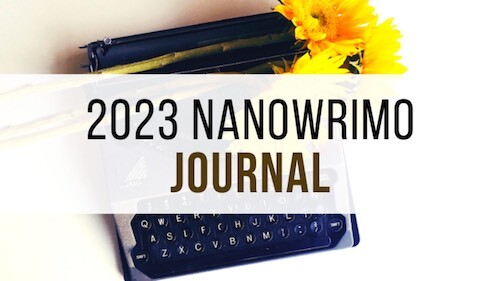IN THIS ISSUE
- From the Editor’s Desk: The 3 steps to writing a novel
- On The Wordling: Sign up for a 7-day trial to Wordling Plus
- News & Views: Hay House is sold. How does this affect authors?

FROM THE EDITOR’S DESK
Hi friends,
I did it! Ten days ago, I finished the first draft of the novel I started writing during NaNoWriMo. 73,000 not-shitty words that I’m actually excited to revisit.
I wanted the writing of this book to be simple, if not easy, and I believe I achieved that simplicity and found a process I can use going forward. I learned somewhere a long time ago that you only need three drafts for a book, each with a specific purpose:
- The first draft is to make it exist.
- The second draft is to help it make sense.
- The third draft is to make it pretty.
Since I took the time to create an outline, my first draft not only makes the book exist, but mostly makes sense as well. In my second draft, which I hope to start in January, I’ll be looking at the obvious descriptions I’m missing—I almost always forget to note what someone looks like, what they’re wearing, or what season it is. My goal in the second draft is to make sure all the information I need is already contained in the scene. Then the third draft, which is my favorite part of the process, is when I roll up my sleeves, go into each individual scene, and make every sentence sing. Since I don’t write a shitty first draft, this is the point at which I’m perfecting, not fixing.
Obviously every writer has a different process, most of which can only be discovered through a lot of writing. For me, writing this book (which is very much outside of my comfort zone) has been the most fun I’ve ever had writing a novel, so I’m certainly keen to repeat the experience.
And yes, I know I can’t keep talking about books without giving you an update on the publishing side of things. I write cross-cultural fiction, with narratives that are often split between India and the UK. While I have both brown and white characters, the Indian characters and perspectives are centered. Readers get very excited when I tell them this, many publishers have worried about placement—is it an India book, a British book, an immigrant book, or something else? (Something else.) One of the rejections to my last novel actually reads: “I felt that it fell somewhere between women’s fiction and general fiction but ended up not really being either, so I thought we would have a hard time positioning this.”
Three publishers have already expressed an interest in reading this next novel once I’m finished editing (no pressure!), but I worry I’ll run into the same problem with genre slating. So, yes, I’m seriously considering indie publishing (which I love). Publishers may not (yet) know how to sell cross-cultural fiction—but I do! My entire life is cross-cultural, and my Inbox is filled with emails from globally minded readers who are attracted to my work for exactly that reason. All this to say I haven’t decided yet, and I’m in no rush to. I’m cool with both options—making the book successful is my job, no matter how it’s published—so I’m just grateful I live in a time where I have so many avenues available to me. I always bet on myself and champion my own work, regardless of how anyone else feels about it, and this time will be no different.
My focus right now is to write the best book I’ve ever written. And once it’s finished, I have no doubt the next step will reveal itself to me.
Oh, and before I go, I wanted to tell you about something fun we’re trying out. We’ve had a lot of interest in Wordling Plus, but rightly, some of you are worried about making a financial commitment without knowing what’s inside.
So we’re offering a 7-day trial for new members!
You’ll get full access to everything inside the membership and, if you like it, stay on. If not, that’s cool, too. Cancellation is super easy, and I’m here to assist you every step of the way. Sign up here.
Enjoy the issue!
Natasha Khullar Relph
Editor, The Wordling
ON THE WORDLING
Want to know how I got one-on-one feedback on my pitches from a TIME editor before I’d ever worked with him?
I have that story—and four others—in a series of case studies I’ve put together that detail how I landed top assignments, made $10k from a single assignment, and broke into some very prestigious publications. Read them here.
WHAT’S INSIDE WORDLING PLUS?

In October 2023, I realized that the biggest barrier to my success as an author was a self-created one: I had no structure or commitment around my writing.
While I pride myself on showing up daily for my freelancing (which is, presumably, why I succeed at it), I did not have the same level of commitment when it came to books.
I had this realization on October 15. On October 16, I picked an idea from a huge list of ideas that I’m always collecting for books and stories, and decided to start working on it. With NaNoWriMo coming up, it seemed like the perfect opportunity to build a writing routine and commit to showing up daily.
Over the next two weeks, using the “Save the Cat” methodology, I outlined my story. And in November, I finished the first 50,000 words of the book. By December 10, I finished the first draft.
My 2023 NaNoWriMo Journal is a behind the scenes look into that process.
Want to read it? Sign up for a 7-day trial to Wordling PLUS to get access to the journal and 20+ other courses on writing, freelancing, and publishing.
See you there!
NEWS & VIEWS:
What happens when your publisher is acquired?

Last week, news broke that Hay House, the spiritual, health, and wellness publisher founded by Louise Hay in 1984, had sold to Penguin Random House. Publishing Perspective notes that the publisher’s product lines currently include “at least 74 online courses, daily affirmation calendars, zodiacal card sets for horoscopes, and coloring books, in addition to live and online events, audio products, meditation and affirmation guides, journals, and more.”
Authors who’ve been with Hay House will now be under the Penguin Random House umbrella. If that’s you, or if your publisher ever gets acquired by another, here’s what you need to know.
1. How is the deal structured?
When a publisher is acquired, the existing structure will ultimately change, even if everything remains the same initially. According to Publishers Weekly, Reid Tracy, CEO of Hay House, will continue to run the publisher, which will “retain its editorial and publishing independence,” after the deal closes. In addition, “no changes are planned” for Hay House’s employees, management, or offices in Carlsbad, California, New York, and London.
There are two things to note here: One, they don’t mention the Australia and India offices. I don’t believe this is an oversight. And two, just because there are no changes planned now during this transition doesn’t mean they’re not coming in six months or a year.
2. What does your contract say?
If you’re a Hay House author, you need to look at your contract to get very clear on what happens in a situation like this, or get in touch with your editor for some clarity. You may also be asked to sign a new contract. “Publishing houses find themselves in a position of power when they have merged, because they can negotiate better deals with writers who don’t have other publishers lined up yet,” Sophia Jones, a business consultant, told BookRiot.
3. Who stays and who goes?
“When publishing houses merge, the first thing that happens is that the companies will combine their lists. This means that they will take a look at their combined catalogs and decide which titles to keep, which titles to drop, and which titles to add to their respective lists. These decisions are made based on factors like popularity and profitability.” That’s Jones in BookRiot again.
If you’re Wayne Dyer, Suze Orman, Joe Dispenza, Marianne Williamson, Gabrielle Bernstein, or Jim Kwik, you’ll likely to be fine. In fact, this may be the perfect opportunity to renegotiate a new, and better, deal. If you’re not, though? If you’re a mid-list author or have declining sales, you may be let go. This is also an opportunity, however, to get your rights back and search for a new publisher or indie publish by learning from the mistakes that may have been made the first time around (if your book isn’t selling well, mistakes were made at some point in the process, either in the writing or the marketing).
4. Understanding intellectual property
Most authors, especially those new to publishing, equate the author and the book. It’s important to understand that this is not the case. You are not your book. What Penguin Random House has bought is intellectual property. If you’re well known, they will capitalize on your marketability. But the bottom line, when a publisher looks at an inventory, is simple: Is this profitable or is it not?
It reminds me of something Taylor Swift said when her masters were sold to music manager Scooter Braun’s company. “This is what happens when you sign a deal at 15 to someone for whom the term ‘loyalty’ is clearly just a contractual concept. And when that man says ‘music has value,’ he means its value is beholden to men who had no part in creating it.”
Publishing, too, is a business, and when publishers are sold or merged, author loyalty and care are often forgotten. This is not out of meanness, as in Swift’s case, but just the reality of purchasing 1,500 titles.
As a professional author and businessperson, it’s your responsibility to sign contracts that address worst-case scenarios and ensure that the final decisions when it comes to your work rest with you.
Losing your editor or your publisher or a merger can be a scary time of uncertainty. Or it can be an excellent opportunity to get greater control of your work and the decisions surrounding it.
ALSO SEE
If you’re tempted to sabotage other authors, don’t. The big news these last few days has centered around an author who left fake reviews for competitive books, was found out, and ended up losing both her agent and her book deal.
Also don’t do this: US-based author Demetrious Polychron wrote Lords of the Rings fan fiction. So far, so good. Then he published the book as a “pitch-perfect sequel to The Lord of the Rings” and tried to sue the Tolkien estate and Amazon, claiming the TV series Rings of Power infringed the copyright of his book. Now the Tolkien estate is suing him back.
And finally, did you know that many U.S. prisons ban fantasy and science fiction reading? Here’s why.
GLOBAL REPORT
NEW ZEALAND: “Between 2006 and 2018, the number of journalists working in Aotearoa New Zealand more than halved. New Zealand’s media sector is currently facing formidable headwinds due to the closing of the government’s contestable public-interest journalism fund, declining readership numbers, and a steep drop in advertising revenue. Arts coverage, says David Rowe, head of journalism planning at New Zealand Media and Entertainment, ‘tends to suffer first, because in terms of core business, it’s not right at the absolute heart.’”
MEXICO: “While the fair always attracts several hundred U.S. librarians, who attend to buy Spanish-language titles, more U.S. publishers went to the fair this year than in past years—a sign that business between the U.S. and Mexican markets is growing.”
TURKEY: “‘In Turkey, there is a noticeable absence of experts in the field of climate change and policy among correspondents and journalists. Specifically, there is a lack of dedicated climate journalists,’ said Özlem Katısöz, Turkey policy coordinator at Climate Action Network. Still, some Turkish journalists are dedicated to the beat, reporting on topics such as deforestation due to coal mining, climate change-induced wildfires, and the effects of fossil fuel markets on public institutions.
QUOTE OF THE WEEK
“I’m sure I could write endlessly about nothing. If only I had nothing to say.”
– Patti Smith
LIKE WHAT YOU’RE READING?
Time taken to assemble this newsletter: 4 hours and 15 min.
If you’re enjoying The Wordling, support our work by buying us a coffee.

